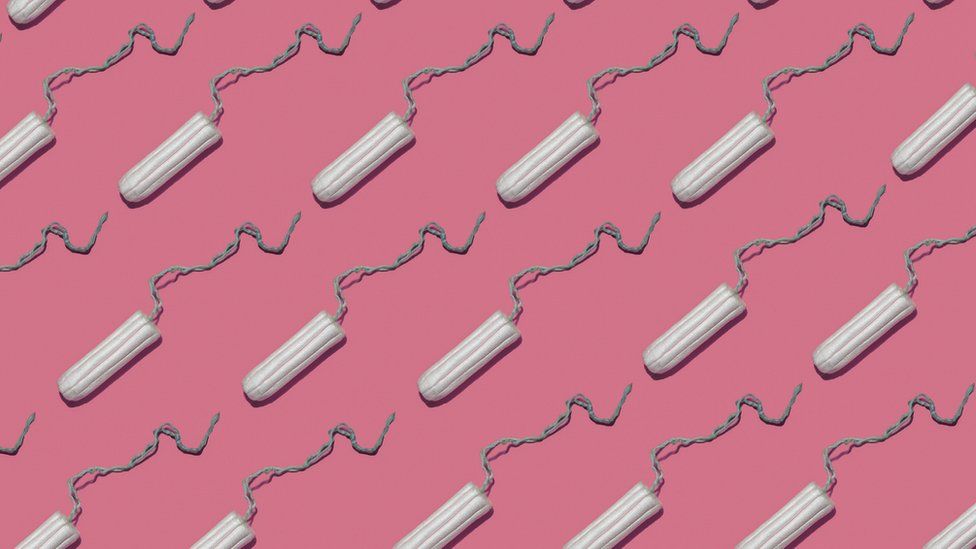Covid vaccine: Period changes could be a harmless side effect
SharecloseShare pageCopy linkAbout sharingimage copyrightGetty ImagesAt a Covid vaccine appointment, you will probably be warned of possible side effects – fever, headache, a sore arm for a day or two afterwards. Changes to the menstrual cycle will not appear on the list.But women online around the world have started asking if early, heavy or painful periods might be an unlisted reaction to the jab. Dr Kate Clancy, a medical anthropologist, shared on Twitter her experience of an unusually heavy period following the Moderna vaccine, and received dozens of similar accounts in response. With former colleague Dr Katharine Lee, she launched a survey documenting people’s experiences.We don’t yet know whether the vaccine is causing these changes – it hasn’t been studied. It’s possible women post-vaccination were more likely to notice or attribute changes, particularly after hearing about others’ experiences.But Dr Victoria Male, a reproductive immunologist at Imperial College London, said some post-menopausal women, and people taking hormones which stop their periods, have reported bleeding. So she’s inclined to suspect there may be a harmless physical reaction occurring. A number of trans men and post-menopausal women who don’t normally have periods got in touch with Drs Clancy and Lee saying they had experienced bleeding after the jab. And, though the link is unproven, there are logical reasons the vaccine could be causing changes to periods – but these changes are not anything to worry about, reproductive specialists say. Plausible linkThe womb lining is part of the immune system – in fact there are immune cells in almost every part of the body. Immune cells play a role in building up, maintaining and breaking down the lining of the uterus – which thickens to prepare for a pregnancy, and then sheds in the form of a period if the egg is not fertilised. After vaccination, lots of chemical signals which have the potential to affect immune cells are circulating round the body. This could cause the womb lining to shed, and lead to spotting or earlier periods, Dr Male explained.No link to miscarriageThis doesn’t mean there is any link to miscarriages though – during pregnancy different processes maintain the womb lining, including the presence of the placenta – the organ linking the fetus to its mother’s blood supply. There is now extensive evidence to suggest there is no link between the vaccine and pregnancy loss.Pregnant women should be offered Covid vaccineAs well as effects on the womb lining, the timing of ovulation (when an egg is released) can be affected by inflammation, for example if someone has a fever, Dr Alexandra Alvergne, at the University of Oxford, explains. This can lead to an early or delayed period. There is also some evidence from a previous study that people with signs of inflammation had more painful periods.Vaccines also cause an inflammatory response in the body – it’s all part of your immune system firing up and starting to produce the antibodies and other cells that fight disease. The effects are all temporaryThere is evidence from both the flu and HPV vaccines that they can affect the menstrual cycle temporarily – but there are no long-term side effects. And there’s “masses of evidence” they don’t affect fertility, Dr Male said. The unfounded claims about vaccines and fertilityWhile these changes shouldn’t be of concern, Dr Male and others spoken to for this article emphasise the need for studies into the effect of the vaccine on periods, so that people know what to expect.”There’s an issue here about how often women’s health is ignored,” she said.”Imagine if you didn’t know that fever could be a vaccine side effect?” gynaecologist Dr Jen Gunter wrote on her site The Vajenda.”You might be concerned that something untoward was happening to your body, when all you were experiencing was a typical post-vaccine fever. That is exactly the same with menstrual irregularities.”Equally, for trans men and post-menopausal women, bleeding can be a sign of cancer, so it’s important for people to know whether it is also a harmless vaccine side effect, Dr Lee explained.Dr Sue Ward, vice-president of the Royal College of Obstetricians and Gynaecologists, said anyone who notices bleeding that is unusual for them should consider contacting their doctor. And she encouraged people to think about reporting any concerns or possible side effects to the Yellow Card scheme to help track them. Vaccine misinformationMeanwhile, the notion of vaccines affecting periods has been picked up by people spreading misinformation on social media. Anti-vaccine and conspiracy theory groups have presented genuine accounts of people’s personal experiences – like Dr Clancy’s thread – as evidence of vaccines causing damage, or being part of a sterilisation plot by global elites. False claims that women’s cycles or even pregnancies could be affected just by being near vaccinated people have gained significant traction on social media in recent weeks.One such video, viewed well over 300,000 times since mid-April, shows a “holistic reproductive practitioner” warning users that “women’s periods and their menstrual cycles are being significantly affected, even if they haven’t received it [the vaccine] themselves”. Other anti-vaccine advocates and holistic health practitioners, in posts gaining hundreds of thousands of views across platforms, claimed vaccinated people can “shed” the virus’s spike protein to others. This is physically impossible.Most Covid-19 vaccines work by giving the body instructions to make a tiny fragment of the virus’s distinctive spike so it can learn how to fight it off. The spike protein, which cannot reproduce, then disintegrates or is destroyed.The mRNA – the instruction to make the spike protein – is also extremely fragile. That’s why those vaccines are so hard to store and transport, because the genetic information falls apart and becomes useless very easily. None of the vaccines allow any part of the virus to replicate, let alone shed – the only thing replicating are your immune cells which produce antibodies to fight off viruses.
Read more →
